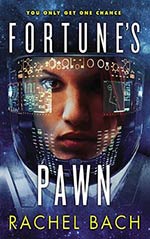
![]() Parnassus Reads
Parnassus Reads
2/9/2014
![]()
Fortune's Pawn, by Rachel Bach, is the first book in the Paradox trilogy. It introduces Devi Morris, the battle-hardened, armor-loving, ambitious mercenary who, hoping for a short-cut to her dream of being a member of the King's own guard, the Devastators, takes a job on a supposedly cursed trade-ship, the Glorious Fool, as a security guard. The ship is cursed because of the list of dead crew attached to it, but Devi doesn't give a damn. She's bored with the top-tier private mercenary company, the Blackbirds, and loves nothing more than a big, bloody fight. One year aboard this ship, her contact tells her, and she's guaranteed to get noticed by the Devastators.
Thus starts Devi's seemingly mundane run on the Fool. Things quickly get interesting, and the plot, as they say, thickens. The Fool's captain is not quite what he seems, and neither is its cook, who Devi falls for immediately upon locking eyes with him for the first time. She's no fool for love though and tells herself that it's just lust. As Devi adjusts to life on the ship, we meet its crew, which is remarkably similar to that of Firefly, with some alterations so as not to be too obviously ripping it off. But in many ways it does. I won't go so far as to say that Bach is unoriginal, but I will say that she borrowed too heavily from her influences.Yet we're not quite dealing with the frontier-style world of Firefly, so the inclusion of the armored suits, which seem straight out of Halo or one of its imitators, is a good addition, if a little over-done.
The episodic exploration-style narrative, which worked so well for Firefly, allows Bach's necessary plot points to pop up more organically than a strictly linear narrative, yet her plotting is a little heavy-handed. The fishiness of the captain and his trade excursions takes a back seat to the mystery of and love affair with the cook (yet of course, they are related), which is unfortunate. Bach seems to want to comment critically on many of the tropes surrounding female characters in SF, but ultimately makes Devi subject to them. That Devi as a character is aware enough to comment on them only makes it worse.
The writing itself is fairly plain but readable and it's easy to see that Bach loves her subject. The battle scenes are, to my limited perspective, well-done and the armor descriptions, if too frequent for my enjoyment, gave a clear picture of what they were and what they could do. That's what you get with an armor nut for a main character, I suppose. Bach deals with the hard SF by nicely sidestepping it; this book cares more about characters than world-building, which makes it fairly quick, light reading.
And that's fine. I appreciate Bach's addition to the growing pool of awesome female characters in SF, and I appreciate Bach as a female SF writer. These books may not win a Nebula, but hopefully they'll draw more female readers in to SF and continue to show that the genre's not just for white men. However, Bach does not get a free pass for problematic race issues just because she's an underrepresented writer in SF, and there are some problems in this book. Most of the characters are a default white (i.e. directly described as such or not described at all, indicating that the status quo/default is white), and one of the three alien races represented is presented as being dark-scaled lizards who are blood-thirsty, slaving beasts, yet who are also capable of genetically changing their race several times and of engineering a deadly, transferable virus (a big step up from Firefly's Reavers, who they are clearly modeled on). One of these reformed creatures happens to be the Fool's doctor. Devi is openly racist and hostile towards it throughout the book, as is the other newcomer, even though it has saved her life several times. I cannot mention the other aspect of the novel I found problematic without giving away a huge chunk of the plot. What I am talking about may seem like minor notes easily justifiable by the world Bach has created, but as several SF/F writers have recently pointed out, when things like racism or sexism are taken for granted, no matter how much the author tries to subvert the stereotypes she herself has written in, the status quo remains the same. It's also a failure of the imagination.
Yet for all of these issues, the book was still a fun, engaging read, and I can't wait for the other two books in the series, Honor's Knight andHeaven's Queen which are due out in February and April, respectively, of next year.